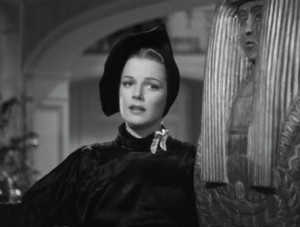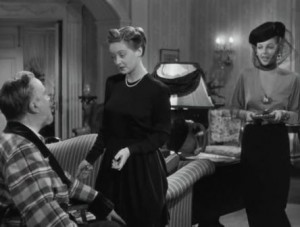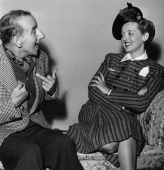 The second of these irritants is Dr. Bradley (George Barbier), who besides reading the wrong x-ray and finding that Whiteside is A-okay, has brought his autobiography, Forty Years an Ohio Doctor, for the celebrity author to read and evaluate. Throughout the film Whiteside puts him off, but it seems that whenever he is in the midst of some commotion, this “corner druggist” enters from a side door, asking, “Are you busy?”
The second of these irritants is Dr. Bradley (George Barbier), who besides reading the wrong x-ray and finding that Whiteside is A-okay, has brought his autobiography, Forty Years an Ohio Doctor, for the celebrity author to read and evaluate. Throughout the film Whiteside puts him off, but it seems that whenever he is in the midst of some commotion, this “corner druggist” enters from a side door, asking, “Are you busy?”
The third intruder indeed suggests a real apparition, a wisp of an elderly lady (British actress Ruth Vivian who made only two films and died before the decade was out). She seems to descend/ascend stairs and cross rooms on nimble tiptoes, ballerina-like, in thin flowing dresses, accompanied by a combination of ethereal music and pizzicato strings, perhaps Frederick Hollander’s best bit in the score, this and the little waltz for Davis and Travis in that winter scene by the village pond.
This wisp of a woman, Ernest Stanley’s sister Harriet, is exceptionally kind to Whiteside on each of her visits and he to her. She first brings him a bough of holly, then a photo album, finally a Christmas present. Later she asks that he open the present, the only one he does open, although there are gifts under the tree from Winston Churchill, Gypsy Rose Lee, Deanna Durbin and “Somerset Mog-um,” as the cook (Betty Roadman) reads the card. From the first, Whiteside senses Harriet’s face is familiar, and it is only after he has seen a picture of her at twenty-two—her present to him—that he remembers. He uses the knowledge to foil Mr. Stanley’s attempt to evict him and retain his dominion over the household.
As if all this turmoil—the family intrigues, the celebrity arrivals, the general confusion—isn’t enough, a water-tanked octopus arrives from William Beebe and, later, four penguins from Admiral Richard Byrd. From the extremes of society, Whiteside first serves dinner to some murderers from the state penitentiary, some of whom he knows by name, and then entertains Chinese students from the University of Canton. After dismissing Mr. Stanley along with his complaint about a $784 phone bill, Whiteside turns to the men around the table and asks, “Is it true that in China you drown middle-age businessmen at birth?”
 Although Bette Davis receives top billing, the show belongs to Monty Woolley, recreating his Broadway role, based on the abrasive critic Alexander Woollcott, from the George S. Kaufman and Moss Hart play. Even the extravagant performance by Sheridan is a challenge to Davis for time on screen. In fact, Davis, at one point with unattractive swooped-up hair, topped by a beanie, has a thankless role and approaches it as such. Her romance with Travis, which never ignites any magic, is really superfluous. Their outside scenes were conceivably added to make the film less stage-bound, but at the frantic pace of everything the theater origin is hardly noticed.
Although Bette Davis receives top billing, the show belongs to Monty Woolley, recreating his Broadway role, based on the abrasive critic Alexander Woollcott, from the George S. Kaufman and Moss Hart play. Even the extravagant performance by Sheridan is a challenge to Davis for time on screen. In fact, Davis, at one point with unattractive swooped-up hair, topped by a beanie, has a thankless role and approaches it as such. Her romance with Travis, which never ignites any magic, is really superfluous. Their outside scenes were conceivably added to make the film less stage-bound, but at the frantic pace of everything the theater origin is hardly noticed.
The tedious romance aside, the best of the adaptation of the Kaufman-Hart script is due to that famous screenwriting team of Julius and Philip Epstein, who have brilliantly adhered to the spirit and wit of the original. The camera work—an unusual number of panning and zoom shots—is by Tony Guadio.
 And the direction? A surprise. The slap-dash pace of the film and the hundreds, or so it seems, of entries and exits handled with such dispatch would seem unlike the work of William Keighley, not usually comfortable with comedy. As for the uncharacteristic pace, remember that he was replaced by Michael Curtiz soon after filming began on The Adventures of Robin Hood because of his unhurried tempo.
And the direction? A surprise. The slap-dash pace of the film and the hundreds, or so it seems, of entries and exits handled with such dispatch would seem unlike the work of William Keighley, not usually comfortable with comedy. As for the uncharacteristic pace, remember that he was replaced by Michael Curtiz soon after filming began on The Adventures of Robin Hood because of his unhurried tempo.
And, oh, yes: in this menagerie of a movie, there is one other postal delivery besides the octopus and those penguins. Toward the end of the film, a sarcophagus arrives from Egypt. It is sans mummy, of course, and large enough to contain—well, for the sake of argument—a living person. Now, among those who have danced and pranced around that man in the wheelchair, which character would Sheridan Whiteside most likely wish to stuff inside that sarcophagus and, well, ship off to God-knows-where, to, say, Palm Beach, if supposing, just supposing, he did want to jettison someone? I wonder——